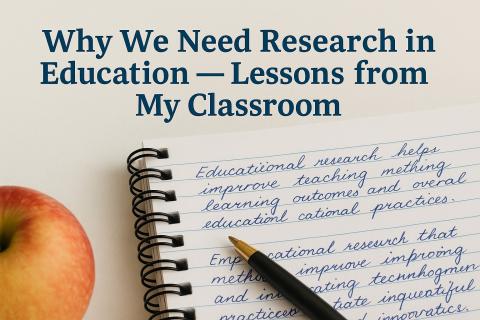
Why We Need Research in Education — Lessons from My Classroom
Co-authored with Jaya, Kunika, and Kanak
In the age of generative AI, when writing is often outsourced, I was pleasantly surprised by the writing skills of my students. One of my classroom rituals is simple — write a page. With school children, it used to be random: “write whatever you feel like.” But with my college students, I give them a topic.
Week after week, I’m challenged not by one or two exceptional submissions, but by the majority. Around 75–80 students participate, and their clarity of thought often leaves me in awe.
Recently, I asked them to write on Why we need research in education. I was about to introduce Action Research from their syllabus (Curriculum, Pedagogy and Evaluation), but their answers made me pause. Here are three samples:
Why do we need research in education?
“Research in education is essential bcz it helps improve teaching methods, learning outcomes and overall educational practices. It allows educators to identify challenges, test new strategies and implement evidence-based solutions. Through research, we gain a deeper understanding of how students learn, what motivates them, and which teaching techniques are most effective. It helps in shaping educational policies, developing curriculum and integrating technology in meaningful ways. Furthermore, research ensures that education adapts to changing social, cultural and economic needs. In short, educational research bridges theory and practical, ensuring continuous improvement and innovation in the learning process.”-Jaya
“Research in education is essential for improving the quality and effectiveness of teaching and learning. Research helps educators understand how students learn, what teaching methods work best for my classroom and how to address the diverse learning needs of students. Research also plays a key role in the policy making, helping government and institutions to make decisions based on the data and evidences. Research in the field of education is one of most practical and effective method to identify problems in education system of our country, such as dropouts, truancy, inequality, etc. Research in field of education can be done on "Active learning v/s Passive learning". Active learning involves the use of new and engaging pedagogies like activity-based learning, group discussions, etc., where passive learning involves the use of traditional lecture method that does not help in developing interest in students towards the topic or concept.” Kunika
“Educational Research derives from the two words – ‘education’, means acquiring knowledge, skills and values, and ‘research’, means a systematic process or investigation aimed to inquire and get deeper understanding of something for future planning and analysis. Therefore, Educational Research refers to the systematic study or investigation of the educational processes, system and policies. Research in Education is important as it deals with the questions, like “How to improve teaching learning process?” “What developments are needed to make education system capable to cater present time needs?”, etc. Educational research, thus, helps to investigate education system, bridge gap between theory and practices, and improve teaching learning. Furthermore, it helps to develop educational theories, identify / address disparities & challenges, and promote equity in education.” Kanak
I could only bring three examples, not because they are the best, but because these were the only pictures I had when drafting this. Yet the way they’ve articulated the need for research is exceptional.
Often, when asked why we need research in education, the unspoken answer is: because I need a PhD. But here, my 18–21-year-olds argued for its real purpose — to improve systems, bridge gaps, and respond to changing needs.
Apart from their ideas, what overwhelms me more is their ability to express them. Public writing, as I often say, is more about courage than skill. My students have shown both. Generative AI may learn the skill, but courage still belongs to the writer. A sports shoe doesn’t make one a runner — it only supports the runner. Likewise, AI doesn’t make a writer, but it can help one become a better writer. At a time when educators across the globe are concerned about students’ ability to write, my students have made me hopeful.
Resources
My PhD explored children’s write-ups and their implications for the teaching and learning of social sciences. One can find it here. https://shodhganga.inflibnet.ac.in/handle/10603/591031
Recently, I also spoke on the intersectionalities of writing, AI, and neuroscience in a TED Talk. One can find it here.https://youtu.be/Jcv3P6lwhq8?si=M1V_NJHlE8b2L27q
- Log in to post comments
